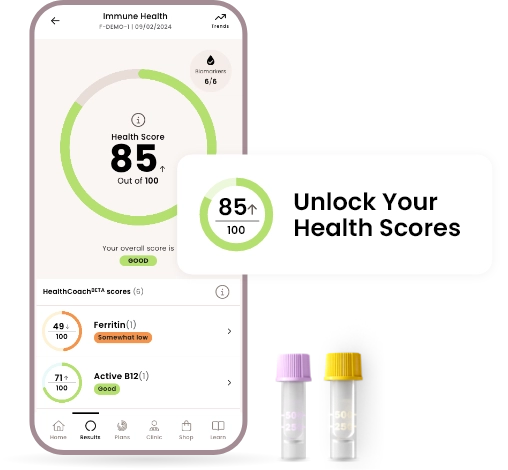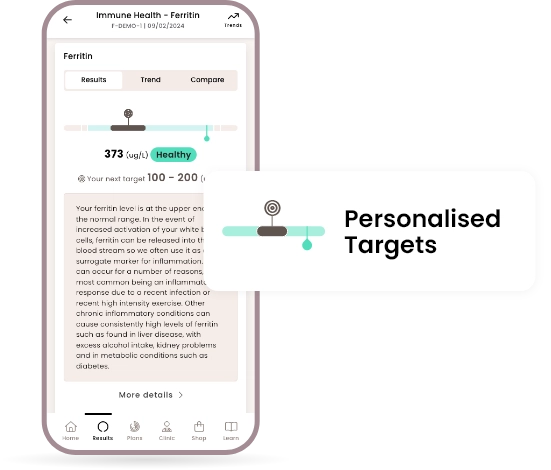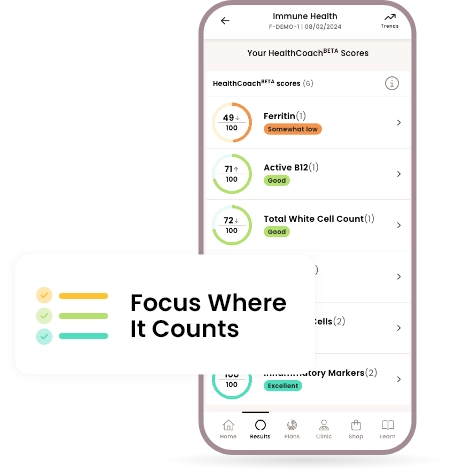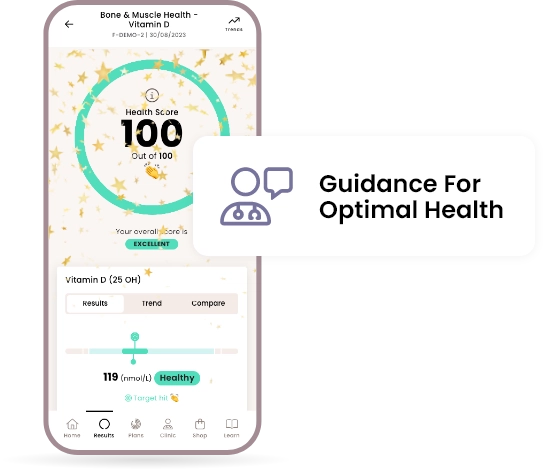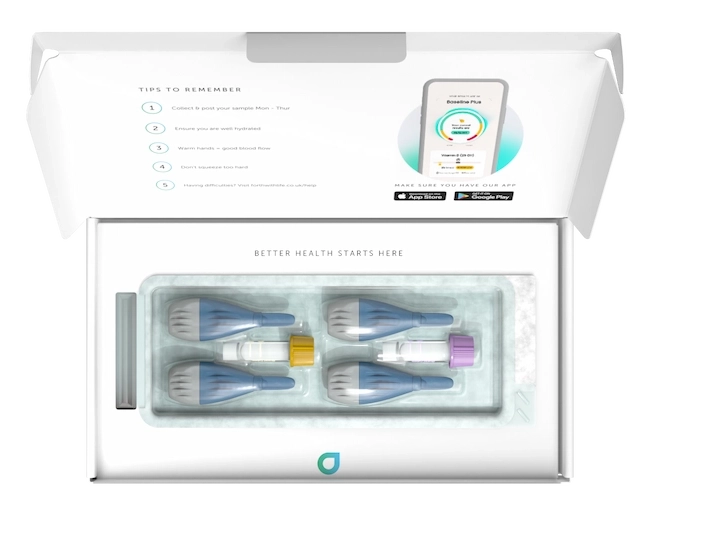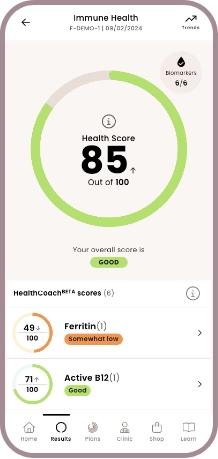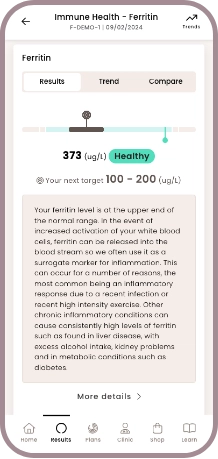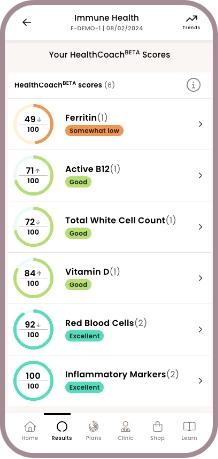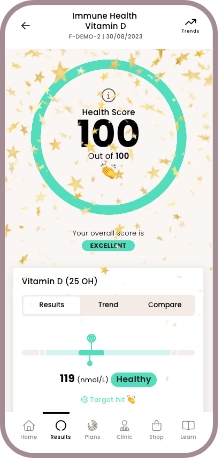About flexible subscriptions
How does a subscription work?
When you purchase this test subscription plan, we will automatically send you another test kit in a few months. Don't worry - you have full control over when this will be, and you can change/cancel it anytime.
When you first purchase this test, you can choose your subscription options in the checkout. We do this, because we recommend taking multiple tests over time to track how your biomarkers change. You'll be charged per test kit (rather than monthly, for example).
Why subscribe to multiple tests?
One test will show you what areas you need to focus on, continued testing will help you learn how your training, diet and lifestyle is impacting your health.
How often should I test?
We recommend a follow up test 3 months after your first test, followed by a test every 6 months depending on your results, but its up to you!
Can I change what's tested in future tests?
Yes, you can tailor/customise subsequent tests (via your app) to focus on just the areas that need improving.
Advanced Energy Blood Test
£137
Our Advanced Energy Blood Test checks vitamin D, B12, and ferritin the same as our Tiredness & Fatigue test, but includes additional biomarkers for a more comprehensive analysis of the causes of low energy. Including thyroid, liver and kidney function, magnesium, haemoglobin, alongside checks for pre-diabetes and inflammation. Get to the bottom of your constant low energy levels.
Validated & analysed by NHS Lab
Tracked 24 delivery
Finger prick or venous collection
Results in 2 working days
3 Interest-free payments
Learn more
Shop now. Pay over time with Klarna
Klarna available at checkout.
Klarna's Pay in 3 / Pay in 30 days are unregulated credit agreements. Borrowing more than you can afford or paying late may negatively impact your financial status and ability to obtain credit. 18+, UK residents only. Subject to status. Ts&Cs and late fees apply.
What gets tested?
24 Biomarkers
Blood sample collection options
How does it work?
When do I take the test?
Collect your blood sample within 3 hours of waking.
Certified for quality & security
Blood sample collection options
You can choose your preferred collection method when you checkout
Finger prick kit (FREE)
You can do this test at home without the need for a doctor. We'll send you everything you need to collect your sample and post it back to us. And it's all included in the cost. We've put together a video that covers the process, making it easy to check and track your health from home.
Home nurse appointment (+£60)
We'll arrange for a medical professional to visit your home and collect your sample. This is great if you're unsure on how it all works or have trouble collecting a sample. No need to book a doctor's appointment or visit a clinic, we'll send you everything you need to collect a sample and post it back to our labs.
Visit a partner clinic (+£45)
Once you've ordered your test, look out for an email from our phlebotomy partners containing information and a link to book your appointment. We'll send you everything the clinic will need to complete the sample and post it back to our labs.
Organise a nurse myself (FREE)
If none of the above options work for you, you can arrange your own medical professional to collect your sample. There is no additional charge for this. Once you've ordered your test, we'll send you everything you and your chosen medical professional will need to collect a sample and post it back to our labs.
Still unsure how it works? You can find more information on collection methods and the service we provide in our 'How it Works' section.
How does it work?
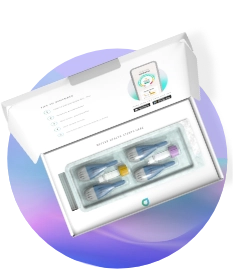
1. Choose your blood test
No need to wait for a GP appointment, your kit will arrive within 1-2 days, which includes everything you need to collect your blood sample and post it back to our labs.
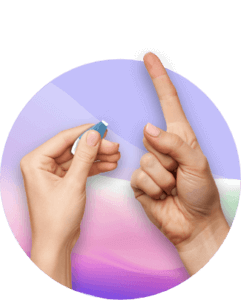
2. Collect your sample
Take your finger prick blood sample at home, or choose to have your blood taken at a Superdrug health clinic or a nurse at home. Return to our NHS lab using our prepaid envelope.
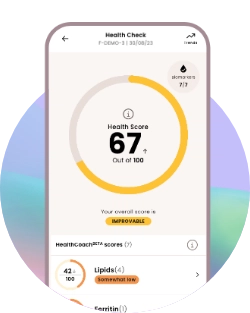
3. View your results
View your results on your secure health dashboard within 2 working days of our lab receiving your sample. Read personalised comments from our GPs.
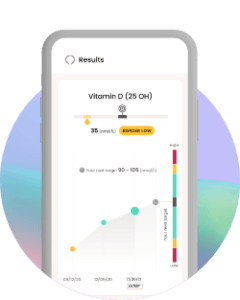
4. Make improvements
With more in-depth results, you will be able to identify areas that need improving. Make the changes and track your progress.
What gets tested?
24 Biomarkers Included
- Active B12
- Alanine Aminotransferase (ALT)
- Albumin
- Alkaline Phosphatase (ALP)
- Cortisol (9am)
- Creatinine
- eGFR
- Ferritin
- Folate (serum)
- Gamma GT
- Globulin
- Haemoglobin
- HbA1c
- Magnesium (serum)
- Red Blood Cell (RBC)
- Thyroid Stimulating Hormone (TSH)
- Thyroxine (T4 free direct)
- Total Protein
- Triiodothyronine (T3 free)
- Urea
- Uric Acid
- Vitamin D (25 OH)
- White Blood Cell Count (WBC)
Additional biomarkers can be added by personalising this test.
What are biomarkers?
Biomarkers are specific compounds we can detect in your blood sample that reflect different things about your health. Your test will tell you your levels for each of the above biomarkers, and whether they are in a normal range.
Did you know?
1 in 8 adults in the UK feel tired all the time
YouGov: One in eight Britons feel tired all the timeUnlock your health scores with HealthCoach™
Powered by cutting-edge technology, Forth’s industry leading app goes beyond reporting basic biomarker results and one-size-fits-all health advice to deliver a comprehensive roadmap to better health.
Your Advanced Energy Blood Test will give you the following Health Scores
Immune health
Liver health
Kidney health
Thyroid health
Why do the Advanced Energy test?
If you’re wanting a more comprehensive analysis to help identify the cause of low energy, then this test is for you. It checks key nutrients such as vitamin D, B12, folate and ferritin along with cortisol (stress), magnesium, and hs-CRP (inflammation). To rule out conditions that could be causing your symptoms this test also checks HbA1c (pre-diabetes) along with thyroid, liver and kidney function along with immune health.
Frequently asked questions
This is what our customers ask us most about this test. For more information, try our help centre.
When will I get my results?
We aim to deliver your results within 2 working days of your blood sample arriving at our lab.
How do I view my results?
When you buy your test, we will ask you to create an account with us during checkout. This will give you access to your own, secure health dashboard where you can view your results.
How do I find out my results are ready?
We keep you updated throughout the process by email and text message.
We will let you know when your blood sample has arrived at our lab. Once the blood sample has been analysed one of our doctors will review your results.
Once your results are ready, we will email you and send you a text message to let you know your results are ready for you to view in your health dashboard.
How do I take my blood sample
It’s easy to take a finger prick blood sample, but we know for some this can be a bit nerve-wracking, especially if you haven’t done it before.
So, we’ve created a how-to video to help you collect a successful sample.
But don’t worry if you don’t manage to get it right first time, just contact our customer support team at [email protected] to request a replacement kit.
How soon will the test arrive?
If you order your test before midday on a Monday to Friday then your kit will be dispatched
the same day.
All our kits are sent out via Royal Mail first class post, so it should be with you within 1-2
working days.
How secure is my data?
We have strict processes in place to ensure the protection of your data. Following GDPR the company also operates under tight legal rules about the sharing of data which ensures that data is only shared if it is crucial to the delivery of our service. For example, our doctors see customer results at the time of review, however, after review, access to results is withdrawn.
Learn more about your data security.
Can I have someone take my blood for me?
Yes. We offer two options if you do not want to do our finger prick test. The first is a home appointment where a nurse comes to your home to take a blood sample. The second is to visit a Phlebotomy clinic near you that offers a blood sample service.
A blood sample will be taken from your vein and we will provide you with everything you need to give to the nurse to allow them to take the sample.
The nurse will give you the blood sample to return to us using the pre-paid envelope provided.
Does a doctor review my results?
We have a team of doctors and nurses who look at all results and will comment on any results that are outside of the normal range for your age.
Can I download the results to share with my GP?
Yes, you can download your results from your health dashboard as a PDF to share with your GP.
Learn how to export your results.
We are dedicated to supporting you on improving your health
Go to help center
Advanced Energy Blood Test, recommended by our doctors
"This test incorporates 24 markers that includes all the 'usual suspects' when we are looking to identify why someone is fatigued or not performing their best. Identifying nutritional deficiencies, hormonal imbalances and metabolic dysfunction means being able to take positive steps to address the root cause and boost your energy levels. "
Dr Thom Phillips
Similar tests
- Health scores calculated
Close
We're changing people's lives
How our Advanced Energy Blood Test works
Getting the insights you need to improve your health has never been easier.

1. Choose your blood test
No need to wait for a GP appointment, your kit will arrive within 1-2 days, which includes everything you need to collect your blood sample and post it back to our labs.

2. Collect your sample
Take your finger prick blood sample at home, or choose to have your blood taken at one of our partner clinics or a nurse at home. Return to our NHS lab using our prepaid envelope.

3. View your results
View your results on your secure health dashboard within 2 working days of our lab receiving your sample. Read personalised comments from our GPs.

4. Make improvements
With more in-depth results, you will be able to identify areas that need improving. Make the changes and track your progress.
What's included in this test?

1x Yellow Tube
1x Purple Tube
4x Lancets

1x Cleansing wipes

Plasters

2x Alcohol swabs
1x Return pouch

1x Tracked 24 return envelope

1x Lab request form
Blood sample kit
Results within 2 working days
Tracked 24 delivery & return
Secure health dashboard
Accredited lab analysis
Doctor reviewed results
Our impact in numbers...
70+
From hormones to nutrients, we offer 70+ different tests
60,000+
We've helped over 60,000 people improve their health
800,000+
We've delivered over 800,000 test results
Related articles
Like this article? Here are some more based on similar topics.
Advanced Energy Blood Test

